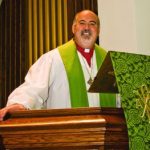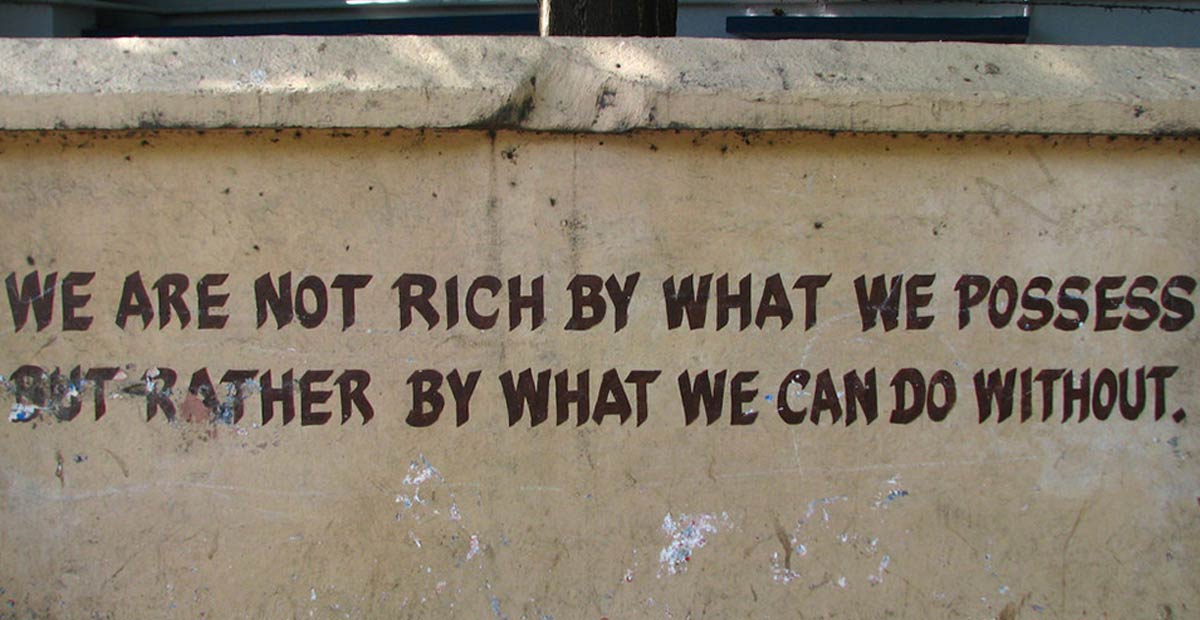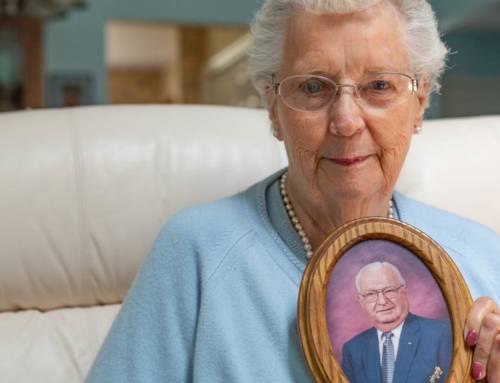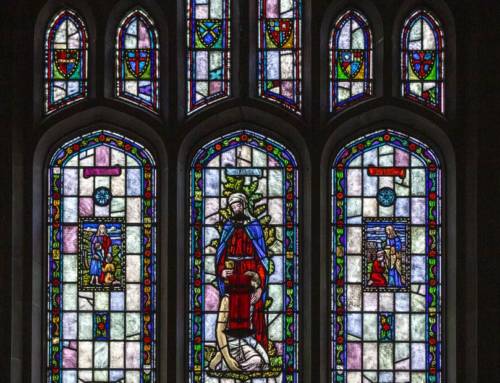
About the Author: Sunday Sermons from Sell Chapel are written by Rev. Preston Van Deursen, Director of Pastoral Care at the Masonic Village at Elizabethtown.
There is an old spiritual that asks this very familiar question: “Were you there when they crucified my Lord?” It’s a question that has been asked through the ages. And every generation has provided its own answer. You and I must answer it as well. Were we there? Were we there when they crucified our Lord?
We know the cast of the original Good Friday drama. They are listed in John’s telling of the passion narrative.
Judas Iscariot was there. He definitely was instrumental in crucifying Jesus. John tells us that Judas came to the garden where Jesus went to pray, guiding a detachment of soldiers and some officials from the chief priests and the Pharisees. They were carrying torches, lanterns and weapons. Judas betrayed Jesus for 30 pieces of silver. Even worse, he betrayed him with a kiss. Was it greed that led Judas to such a desperate act? Perhaps. Greed is a powerful motivator, but 30 pieces of silver wasn’t a lot of money. He may have had another motive.
Perhaps, on the other hand as one popular interpretation declares he wanted to force Jesus’ hand. Judas wanted to hurry the coming of a kingdom in which he would be part of the inner circle, a kingdom in which he would have a high office. That is the unfortunate result of excessive ambition. It’s happened before and it will happen again.
Bishop Fulton J. Sheen once told of a colleague in China, a Bishop Ford, who died a martyr’s death in a communist Chinese prison in 1952. A nun who was imprisoned with Bishop Ford gives us a picture of Bishop Ford’s last days: “His hair was long and white and his beard matted, his face emaciated and pale from torture . . . Whenever Bishop Ford was given a walk outside the prison, being unable to support himself, he leaned on two fellow prisoners. Then came the day of the death march. He was put in line between the two other prisoners. The Chinese Communist colonel who had seized the chapel tied a sack around Bishop Ford’s neck weighing over twenty pounds. He tied it in such a way that the rope would tighten as the bishop walked.”
How did Bishop Ford come to such a fate? “The Bishop’s Chinese cook, who had served him for many years, and whom he regarded as a good friend and a good Christian, was the man who delivered
[Bishop Ford] over to the Communist authorities and falsely accused him. Despite the fact that he knew how the Bishop had [brought solace to] the sick and buried the dead, he nevertheless delivered him over to suffering. The reward the [cook] received was to be made chief of police of that village.”
After Bishop Ford’s martyrdom, the former cook went back to the chapel, threw a rope over a rafter and committed suicide. (1) Betrayal happens. It happens in organizations, it happens in families. It happens in business. It happens in churches.
When it was all over, Judas also went and hanged himself. That’s not surprising. Can there be any sin more grievous than betraying a friend? Judas was there when they crucified my Lord.
Simon Peter was there as well. When the soldiers came to take Jesus, Peter tried to defend him with his sword. He struck the high priest’s servant, a man named Malchus, cutting off his right ear. Jesus commanded Peter, “Put your sword away! Shall I not drink the cup the Father has given me?”
When Jesus was arrested, Peter followed the Master and the soldiers at a distance. And then, before the cock crowed, Peter denied his Lord three times. Where was Peter when the crosses were raised on Golgotha? Nobody knew. Peter was not in sight. He was in hiding. But Peter was there just as surely as Judas was there.
It scarcely seems possible that Peter would have so disappointed the Master. Peter was present every time Jesus performed a miracle or spoke a parable or communed with God. When Jesus walked on the water, it was Simon Peter who tried to duplicate the feat, but faltered and had to be rescued by Christ. Peter was there with James and John on the Mount of Transfiguration when Jesus was revealed once and for all as the chosen one of God. How could Simon Peter deny he ever knew him?
Simon Peter’s sin came about in a moment of weakness, while under intense stress. He was weak as sometimes you and I are weak. It’s not that we go out seeking to do wrong. It’s just that when temptation comes we simply are too weak to resist it. We don’t like to admit we’re weak, but we are.
Pastor John Ortberg tells how that growing up, he loved the comic book hero Superman because he was so strong. He disguised himself as mild-mannered Clark Kent, but his vulnerability was just an act. Underneath was the man of steel. Superman came to help people who were weak and needy; but he himself was never afraid, never confused. “Superman never joined a twelve-step recovery group,” says Ortberg, “even though he had lost both his biological parents and the planet he had called home. He never joined a lonely hearts club, although he was always alone. He never got into therapy, even though he wore blue tights and a cape beneath his regular clothes.” (2)
Superman didn’t know what it was to be weak. But Superman was a fictional character. Clark Kent, his alter ego, fooled people sometimes into thinking he was a normal man, but his vulnerability was just an act. Underneath was the man of steel. Real people, on the other hand, try to be Superman on the outside showing no vulnerability, but underneath they are really just a weak and sometimes confused Clark Kent. Peter, for all his bluster, was a weak man. Peter was there when they crucified my Lord.
Pontius Pilate was also there. Pilate didn’t want to be responsible for Christ’s death. He tried to avoid sentencing Jesus to death by offering the crowd the choice of Barabbas or Jesus. Barabbas is Aramaic for “son of the father.” Ironic. Jesus was the true Son of the Father. But that was the choice the crowd was given, Barabbas or Jesus, and they chose the false son of the Father. Barabbas was a small time insurrectionist. He plotted against the government. He was probably popular with the people because of his opposition to Roman rule. So the crowd chose Barrabas to pardon and Jesus to execute. Pilate’s ploy fails and so he washes his hands of the whole affair. He washes his hands of the chance to do the right thing. He washes his hands of the true Son of God, though deep in his heart he knew that Jesus was who he said he was.
Pontius Pilate was there when they crucified my Lord.
Here’s someone that you may not have thought of who was there when they crucified the Master: Nicodemus. Do you remember Nicodemus? Nicodemus was there when they crucified my Lord. Nicodemus was a prominent Pharisee who had come to Jesus at night. He entered into a deep theological discussion with Jesus on matters such as the Kingdom of God, and God’s sending his son into the world to save humanity from its evil ways. It was Nicodemus to whom the Lord spoke those words about not being able to see the Kingdom of God unless he was born again.
I find it heartening that Nicodemus was there. John 7 contains a wonderful story about Jesus’ presence at the Feast of Tabernacles, not long before his arrest and crucifixion. The soldiers, at the urging of the religious elite, were already watching out for Jesus. But he slipped by them into the Temple and began teaching . . . and everyone was astounded at his teaching. This of course infuriated the religious authorities. They confronted the temple guards and asked them, “Why didn’t you bring him in?”
“No one ever spoke the way this man does,” the guards replied.
“You mean he has deceived you also?” the authorities retorted.
At this point Nicodemus, who was a member of the Jewish ruling council steps forward and asks, “Does our law condemn a man without first hearing him to find out what he has been doing?”
Can you imagine how courageous this was on Nicodemus’ part? Notice how the Pharisees responded to his question. They replied, “Are you from Galilee, too? Look into it, and you will find that a prophet does not come out of Galilee.” They were indirectly accusing Nicodemus of being one of Jesus’ disciples.
It appears that Nicodemus got the hint. Like the disciples of Jesus he seems to fade into the woodwork during the rest of the Passion narrative. Fear probably got the best of him. Like Jesus’ disciples he probably wished later he had done more. But he did do one thing: after Jesus was dead, it was Nicodemus, this wealthy and prominent Pharisee, who helped Joseph of Arimathea get Jesus’ body to the tomb. According to John, Nicodemus procured a very large quantity of myrrh and aloes for Jesus’ burial. These were expensive perfumes, which surely cost Nicodemus a small fortune. (3)
It was a small gesture performed too late, but it was undoubtedly a heart-felt gesture of a man who was on his way to being what the Master wanted him to be. Nowhere does the scripture insist that a person must be born again all at once. For many it is a journey of a lifetime. It was for Nicodemus. Tradition tells us that, like many others, Nicodemus was martyred sometime in the first century. But Nicodemus was there when they crucified my Lord.
There were many others there when Christ was crucified. Time will not permit me to tell their stories. Herod, that despicable monarch, was there . . . as were the soldiers who gambled for Christ’s garments while he hung on the cross . . . and the thieves who died on either side of him . . . and the blessed women, including his mother, who wept at the foot of the cross. Only one disciple, John, the beloved disciple was physically there when Jesus died. Jesus assigned to John the care of his mother.
There were other minor characters who were also there when they crucified him including the mob that cried, “Crucify Him! Crucify Him!” Ignorant people, stirred to hatred by molders of public opinion who had their own selfish agenda. Those people, like those molders of opinion are still around today crucifying Christ time after time with their anger, their hatred, their greed.
The question of the night is, of course, were we there when they crucified our Lord? And the answer is yes we were there, as was all humanity. Anyone who has ever been cowardly and given in to the crowd, anyone who has ever kept silent in the face of bigotry and persecution, anyone who has ever been weak when you know you should have been strong was there encouraging this . . . the most tragic crime in history.
Actor and director Mel Gibson has become a sad and controversial figure the past couple of years. Most tragic of all, his personal life now overshadows his remarkable accomplishment in producing the film, The Passion of the Christ. In the film, Gibson makes the point that all of us were there when Christ was crucified. None is exempt. Gibson, the actor, does not appear in the film, but his hand does. At the crucifixion he holds the nail to be driven in the hand of Christ, and holds the hammer that drives it in! He is saying: it is my sin that nailed Him to the Cross! (4)
We were all there. I don’t know about you, but of all the characters who were there I identify most closely with Nicodemus. I confess my sin. I’m not all Christ wants me to be, but there is hope for me. Beginning with this Good Friday service, by the grace of God I can be a better person. I can begin now living more like the Master. How about you? You were there as well. Is this a time for a new beginning for you as well?




